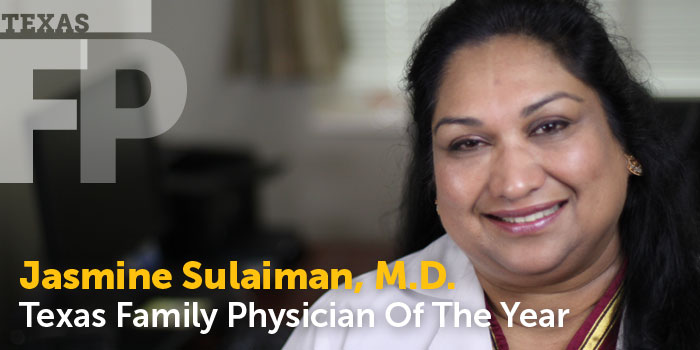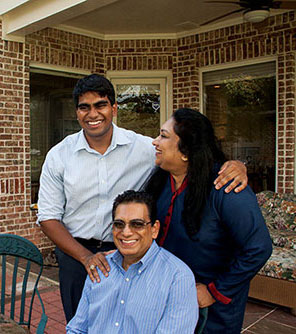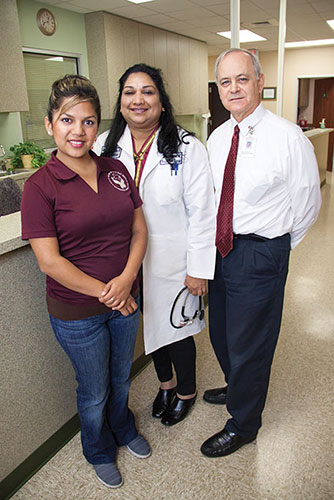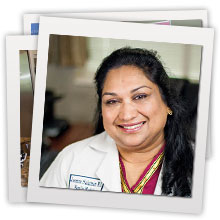Meet TAFP’s Physician of the Year: Jasmine Sulaiman, M.D.

Choosing the road less traveled
Story and photos by Samantha White
Dr. Jasmine Sulaiman worked all week in a Cleveland, Texas clinic treating patients and teaching local women about the dangers of breast cancer. This afternoon, however, she’s being a wife, a mother, and a host, chopping a rainbow of fresh vegetables and baking salmon fillets for a delectable, four-course meal. She likes spending time in her wide-open kitchen when not tending to patients, cooking for and entertaining the ones she loves. Everything she cooks smells delicious. And the taste? Amazing.
“Family, friends, food, freedom, and faith” is the mantra that the 2013-2014 Texas Family Physician of the Year and her family live by, applying it to all aspects of their lives. Sulaiman relates TAFP to food, too. “Actually, the Academy has the cookbook to make you a better family physician or the best family physician,” she says. “I use the recipes to make the better dish.”
Throughout their 26-year marriage, she and her husband, Sulaiman, voyaged around the globe, living in and visiting numerous continents. Along with their two college-age children, Alya and Adiv, the Sulaimans are a tight knit family of four that stays in touch constantly, despite the miles between them. Alya is currently a law student at Georgetown in Washington, D.C. and Adiv is studying petroleum engineering at Texas A&M. They were all in Fort Worth last August when she was given the Physician of the Year award at TAFP’s Annual Session and Scientific Assembly.
“It was good to see her finally become recognized for the person she is and the way she conducts herself,” Adiv says. “It’s something I’ve known for 20 years of my life, but it’s good to see that recognized on a greater scale.” Sulaiman’s humble outlook on her career was apparent during her acceptance speech for the award at Annual Session. “Actually I don’t do anything different than any of you other family physicians do,” Sulaiman said.
While growing up in Kerala, India, Sulaiman’s journalist father died from a heart attack when he was just 45 years old. “Sometimes I think that’s what made me go into medicine,” she says. Being the oldest of three girls, Sulaiman’s mother was a very modern Muslim woman, teaching her daughters the importance education could hold in their future lives, warning them that there were no guarantees in life.
“She really believed in the power of education and being independent,” Sulaiman says about her mother. “She gave us the freedom to do whatever we wanted to do.” With that, she chose a life as a physician.
After earning her medical degree in Kerala, and completing an internship in Saudi Arabia, Sulaiman and her family relocated to Utica, N.Y. There, at Columbia University, she completed her residency in the Bassett Elizabeth Family Medicine Program. She then took a job at one of the program’s satellite clinics during the influx of refugees from Bosnia and Kosovo. The clinic just so happened to be one of the largest refugee settlements, spiking her interest in working with underserved populations. From there she completed a faculty development fellowship in family medicine at the University of North Carolina School of Medicine and took part in a health leadership program in Duke’s Department of Community and Family Medicine.
Her husband was an electrical engineer and after a work trip to Houston, they jumped at the chance to escape “six months of snow” and headed South. After searching on the AAFP job site, she interviewed with Steve Racciato, CEO of the Health Center of Southeast Texas. He was establishing a new clinic in Cleveland, Texas, and was in need of a medical director and practicing physician.
Attracting interested physicians for the position had been difficult, then Sulaiman’s resume landed on Racciato’s desk. Her Ivy League education and teaching background made her stand out from the crowd of applicants. “So we were pleasantly surprised to be seeing a resume with that much information, those credentials on it,” says Racciato.
Before beginning the interview, the board said a prayer with Sulaiman. She then knew that this was where she needed to be. With the clinic to have yet landed stable funding, taking the position would be a challenge, but she knew helping this community in need was the right fit for her.

The 2013-2014 Texas Family Physician of the Year with her husband, Sulaiman, and son, Adiv, at their home.
Cleveland is a rural town about 45 miles northeast of downtown Houston with a population of just over 7,600. Being in such a rural area, Sulaiman sees people from towns around Cleveland too – some traveling 30 and 40 miles just for basic health care.
When Sulaiman joined the health center in 2006, the local hospital provided “seed money,” as Racciato calls it, to pay her salary, as well as his. The Cleveland Regional Medical Center also helped them purchase a quaint, two-room flower shop they renovated and turned into a clinic.
Sulaiman saw 4,000 patients that first year, charging $5 to those who could afford it, and nothing to those who couldn’t. While gathering information on becoming a federally qualified health center, they received a grant from the state called an incubator fund, a sum of money awarded to clinics in the process of applying for a FQHC grant.
The grant couldn’t have come at a better time – the Cleveland hospital stopped their funding and the Health Center of Southeast Texas was barely surviving financially. Racciato jokes about the days when they weren’t sure how they would meet payroll. Somehow, they always did. He would tell Sulaiman how many patients they needed to see to be able to pay their employees, and she would see that many, no questions asked. Racciato remembers Sulaiman seeing 36 patients in one day, working well into the evening without hesitation or complaint.
The clinic finally reached FQHC status, supplying them with funds necessary to see patients “regardless of ability to pay, taking anybody that comes through the door,” says Racciato. They also get a Susan G. Komen grant for breast cancer screenings and education, as well as a state grant meant specifically for breast and cervical cancer services.
“Actually, the Academy has the cookbook to make you a better family physician or the best family physician. I use the recipes to make the better dish.” – Jasmine Sulaiman, M.D.
“I’ve been lonesome for you,” an elderly patient says upon Sulaiman’s arrival at her home. Because of the rural location of the clinic, Sulaiman and her team of medical assistants travel up to 25 miles away to do home visits for patients unable to make it to town. On the flip side, patient Doris Cuellar travels 30 to 40 minutes for her appointments with Sulaiman. “I’d rather have Dr. Jasmine any day,” she says. A patient of Sulaiman’s since 2009, Cuellar drives the long distance to Sulaiman’s clinic because she can’t imagine having another doctor.
It’s obvious how much of a friend Sulaiman becomes to patients, both young and elderly alike. A 12-year-old patient wrote a physician of the year nomination letter on Sulaiman’s behalf describing her as “kind, caring, and loving,” adding that the doctor checks her grades and encourages the young girl to become a doctor one day. “She acts like my mother sometimes, but in the end she’s the best doctor I could have,” the little girl wrote.
Caring for people feeds Sulaiman’s zest for life. Her face lights up when she tells stories about the clinic, her staff, her patients, and her experiences as a physician. From finding housing for a local homeless man to the time one of her staff adopted a dog found at the clinic, these stories keep her engaged in her daily physician tasks.
“We work as a family, actually,” Sulaiman says of her clinic staff. She describes Racciato as the “pulse” of the clinic and says that the rest of the staff shares his spirit about helping out their fellow man. She thanked her staff and patients in her award acceptance speech, saying it wouldn’t be possible for her to do her job without their support.
This theme of helping people out and caring for everyone around is apparent in her nomination materials for the physician of the year award. Sulaiman’s nominator, a fellow physician, explains Sulaiman’s bedside manner with patients. “Dr. Sulaiman’s patients do not simply consider her a physician; she is a healer, counselor, mentor, and friend,” they wrote. One of the clinic’s current medical assistants, Lechelle Williams, also wrote a nomination letter on Sulaiman’s behalf, saying that she is always willing to both laugh and cry with patients while listening to their problems. “To me you are more. You are a friend, mother, role model, and a well experienced provider, thoroughly familiar with the needs and problems of others,” Williams wrote. Sulaiman is described as a friend time and time again.
Racciato thinks that Sulaiman’s even taking the position in Cleveland says much about her character as a physician. “She could if she wanted to, let’s face it, with her credentials, she could have a teaching position at Baylor. She could have a teaching position at UT right here in town. She could’ve done a group of family physicians; she could’ve gone into a multi-specialty practice. With her credentials, I’m sure they would’ve had no problem accommodating her and getting her certainly a higher salary than what we were going to be able to pay her. She nonetheless opted to come with us.”

Maggie Estrada, Sulaiman, and Steve Racciato at the Health Center of Southeast Texas.
He adds that Sulaiman, much like the rest of the staff at the clinic, gets a certain amount of personal satisfaction out of helping their patients on a daily basis. Sulaiman’s husband agrees. “Of all the job opportunities she had she went to a really small town, helping people in need,” he says. “She enjoys more giving back to the community.”
Maggie Estrada started as the receptionist of the health center and is currently the office manager. With the help of Sulaiman and Racciato, she went through medical assistant training and learned about health care billing to work her way up at the clinic. The three of them have worked together since the beginning to get the health center where it is today. Sulaiman, she says, is not just about the money.
“Dr. Sulaiman wants to grow our clinic but she’s not just looking for the money. She’s actually a listener. She’ll sit with any patient, she’ll care. She’ll get real personal with patients where they can talk to her; they’ll open up to her.”
To Sulaiman, this is simply the definition of a family physician—diagnosing patients while delivering the best care possible. She realizes, however, that primary care and the medical field in general are not that simple. The complex and ever-changing world of medicine keeps Sulaiman on her toes and gives her a thirst for more knowledge.
“From my experience the best way to keep up with these changes is to educate others,” Sulaiman says. She has high school students interested in the medical field shadow her each summer to learn about being a physician and invites residents to Cleveland to learn about the specialty of family medicine. Sulaiman follows and teaches a Sanskrit saying that means “knowledge is the everlasting wealth, perhaps the only wealth that keeps on growing by sharing or giving.” As important as teaching future physicians is, she believes educating her patients is just as important.
“Patient education is one of my platforms since training days,” Sulaiman says. She believes patients have the right to know what is going on with their health and that their knowledge is a big part of their health care plan. This drives her to be active in the local community – being present at local health fairs and participating in programs like Hard Hats for Little Heads and Tar Wars.
In addition to the health center and treating inmates at a nearby jail on a monthly basis, Sulaiman’s work with the Health Center of Southeast Texas is expanding. They opened a satellite clinic in Shepherd, an even smaller community just 12 miles north of Cleveland. A third clinic will open in February 2014 in Liberty, just over 30 miles southeast of Cleveland. Sulaiman also passed the PCMH Content Expert Certification exam recently, allowing them to apply to become a patient centered medical home this year.
“We are all fortunate. The way we live. That’s one thing I tell everybody, even a smile can do it. That makes a lot of difference.” – Jasmine Sulaiman, M.D.
Volunteering has always been important to Sulaiman and her family. Her children were raised volunteering in their spare time—an activity they both still partake in regularly and a quality they will carry with them for the rest of their lives. “I think it’s really established the value and the importance of selfless service for me,” Adiv says. “She has a natural compassion,” says Alya.
Alya always has volunteer opportunities waiting for her when she arrives back in Texas on vacation from law school. “No matter how busy she’s gotten, she always makes it a point to help out locally.”
Sulaiman’s son Adiv shares the sentiment with his sister. “She obviously cares about everyone,” he says. “She tries to put a lot of love into everything she does.”
As an international medical graduate, Sulaiman hopes her winning the physician of the year award is encouragement for other foreign graduates hoping to work in the U.S., showing them that they, too, can be recognized and that being a foreign graduate is no disqualification to being acknowledged as a great physician.
The countries she studied in didn’t offer family medicine as a specialty. “I didn’t have much knowledge about what exactly family medicine is until I got into a residency,” Sulaiman says. She hopes more international medical graduates become aware of primary care and see it as a prestigious specialty.
Whether tending to her patients or feeding a stampede of her son’s friends at a moment’s notice Sulaiman lives every day with a servant’s heart. If people around her learn anything from Sulaiman, she hopes it is this: “We are all fortunate. The way we live. That’s one thing I tell everybody, even a smile can do it. That makes a lot of difference.”
